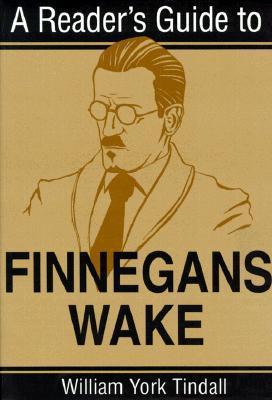"What we call the beginning is often the end. And to make an end is to make a beginning. The end is where we start from." - T. S. Eliot
Some one in my Finnegans Wake reading group said of the Tindall guide, finding it nearly as incomprehensible as Joyce's famous night novel, "You need a guide for the reader's guide." It was at times abstruse, with Tindall sometimes glossing over whole sections, admitting that he didn't understand something or flat out suggesting that his interpretation could be wrong. The thing about Finnegans Wake is there are so many different ways of approaching the text, of trying to understand it, and many scholars of the work admit that it is a tough egg to crack. It was Anthony Burgess in his Re Joyce who admitted that he could generously say that he understands less than half of the book (I don't remember the exact percentage). And though not certain, I wouldn't be surprised if James Joyce himself wouldn't reread the work and make the same admission that Thomas Pynchon made about Gravity's Rainbow, that he had no idea what he meant in certain passages.
Now if there are two main ways to read FW, one analytical (and riddled with problems) and the other musical (and also in a way filled with problems, because this is quite a long musical commitment), it might be argued that for simple lack of agreement between scholars that the latter method of reading the Wake is the better. And there is a joy in reading the Wake this way (it's a work meant to be read aloud after all -- for me, much to the annoyance of my wife and kids).
However, if one opts for an analytical read, as I did to some extent, Tindall's work is one of several that might be deemed indispensable. Along with this one I read Burgess's Re Joyce and Stanislaus Joyce's (James' brother's) My Brother's Keeper, all of which helped shed some light on this book of the dark. My group also used the website Finwake.com, which was very useful in assisting with an understanding of certain references. And I also picked up Joyce's Book of the Dark by John Bishop (with many fun diagrams and digressions), though I doubt I will finish reading it now that my quest with the Wake is complete (at least for now). And many others have found Joseph Campbell's skeleton key to the Wake very useful. Again, this is one I would have liked to have read while immersed in Joyce's night book, but which I now very much doubt I'll get around to now any time soon.
While some justify reading the Wake for its musical quality, I don't think this would have sustained me for 628 pages. For an analytical read I cannot suggest Tindall enough, but in conjunction with Burgess, Campbell or some others. And, of course, I don't think I would have extracted as much as I did from the Wake (which is probably far less still than Burgess admits to yielding from it) without the persistence of my fellow readers, who met every Sunday morning for about two years to discuss and dissect Joyce's work. If this last paragraph sounds a bit like one of those award ceremony speeches, it is I suppose because there is a certain sense of accomplishment in having made it back to the beginning of the Wake, and I realize that I might never have done so without a little help along the way.
If I read the Wake again, having cramped with extensive notes (see that HCE there? Did you notice it?) the margins of my copy, I supposed it would be to read it musically (perhaps mythically). But for now, I will leave the Wake again at the beginning where at "riverrun, past Eve and Adam's, from swerve of shore to bend of bay, brings us by a commodius vicus of recirculation back to Howth Castle and Environs," before the flood, before the fall, before the dream, before Shem and Shawn (or Mutt and Jute, eye and ear, stone and tree), Isobel's heliotrope undies, the incident in the Park, before Buckley shoots the Russian General, but yet anticipating them all.

